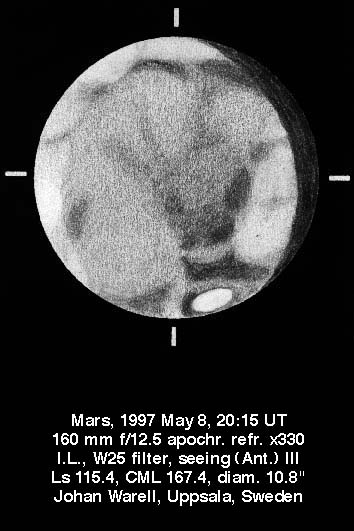

Very intriguing albedo detail on mid-disk across Amazonis-Azania area, much enhanced with W25, only a shallow northern "bowl"-shape seen in IL. A faint dusky bowl-shaped area was enhanced by the four darker shadings of Aphnitis Fons, Propontis I, Castorius Lacus and Phlegra. Propontis I was wide and dusky with Castorius Lacus to its E; its N border to Herculis Pons was dark and quite easy, elongated. The "bowl" was delimited to the W by large and drop-shaped Phlegra, extending westewards by faint Trivium Charontis-Cerberus I and very faint Chaos separating Elysium from Cebrenia. A quite large but very difficult dusky spot was seen at the location of Castaria Fons, separated somewhat from the duskiness of Propontis I; it was extended south across Zephyria joining Mare Cimmerium with a dusky band. From Aphnitis Fons extended, in a SE direction, two elongated shadings, the N one ending at Biblis Fons (not detected as a separate or enhanced spot), the S one ending at Eumenides.
At the ev. limb, Phoenicis Lacus was a dusky elongated
patch and quite easy. To its S another, larger, dusky area was seen, located
NE of Mare Sirenum (Sirii Fons?). Ascraeus Lacus at ev. limb. Herculis Pons
was very easy and well marked between Propontis I and II. Propontis II was
pointed at its E and W ends and very prominent, joining Lemuria along the
70th parallell. Hyperboreus Lacus was very dark p. NPC. Maeotis Palus-Mare
Boreum at p. limb. NPC was seen inside the disk and seemed slightly larger
than previously in IL. Phaethontis, Tharsis and Ceraunius bright on ev.
limb, Elysium showed a Moderately Bright-Bright core in the morning limb
haze with W80A and W58, the same as the case of Ceraunius, which was Bright
in both filters. I could detect no sign of the Olympus Mons orographic.
Observer:
Johan Warell
Coordinator, Nordic
Mars Observers
Wennerbergsg. 11
S-754 21 Uppsala, Sweden
E-mail: johan.warell@astro.uu.se